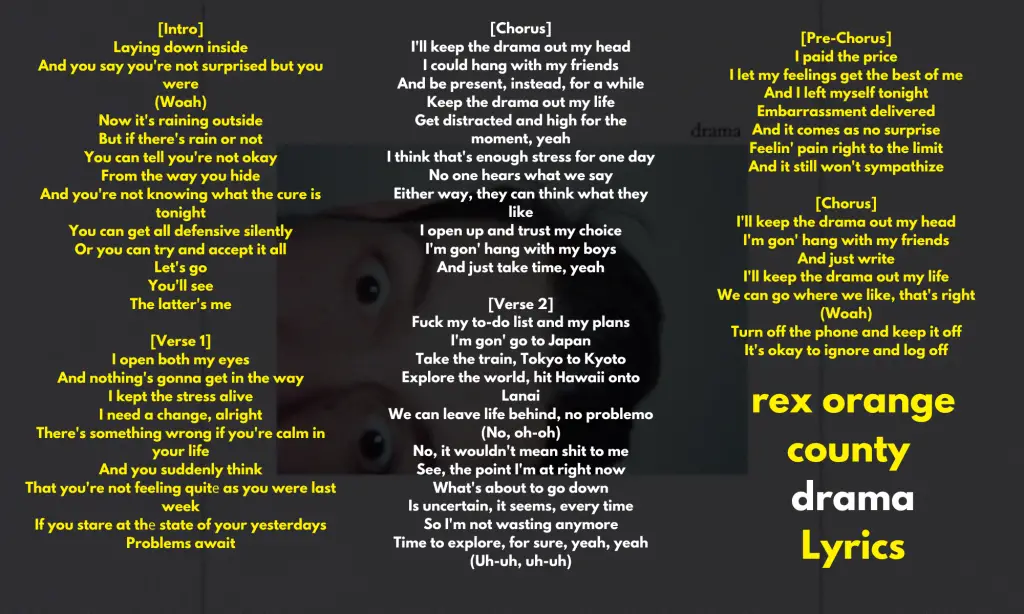Table of Contents
Rex Orange County’s song “Drama” is packed with universally relatable stuff, which is probably why the track is on fire lately. The lyrics dive into everything from stress and self-reflection to the need for connection and escape.
As someone with a background in English literature and creative writing, I couldn’t resist breaking this song down a little more poetically. These are just my own thoughts, but by comparing the song to ideas from classic literature and modern fiction, I hope to shed some light on how its themes are as timeless as they are personal.
After a tough few years, Rex Orange County has returned with music that feels both reflective and intentional. Whether it’s his live performances in more intimate venues like the Beacon Theatre or the carefully crafted lyrics of his album, it’s clear he’s putting emotional honesty front and center. “Drama” hits that honesty, balancing vulnerability with a desire to move forward.
In this article, I’ll unpack the song’s themes and use literary history as a lens to stretch our understanding of its meaning. It’s always fun to see what parallels we can draw between a modern track and timeless questions about how we cope, grow, and stay present in the moment.
“Drama” at a Glance
- It’s about letting go of unnecessary stress. The lyrics focus on cutting out drama and taking time for real, meaningful connections.
- It explores the idea of escape. Whether through travel or turning off distractions, the song shows the importance of stepping away to reset.
- It balances presence and reflection. The speaker admits their mistakes but also focuses on living in the moment and finding peace.
Rex Orange County Drama Lyrics
Rex Orange County Drama Meaning
“Laying down inside / And you say you’re not surprised but you were”
The song opens with a feeling of emotional tension. The speaker describes a moment where someone’s words don’t match their true feelings. They act like they’re not surprised, but deep down, they clearly are. This sets up the song’s theme of emotional honesty—it’s about being real with yourself and others.
The rain imagery in:
“Now it’s raining outside / But if there’s rain or not / You can tell you’re not okay.”
shows that the speaker’s inner world isn’t tied to what’s happening around them. Whether it’s sunny or stormy, the emotions they’re feeling remain. This reminds me of Max Ehrmann’s Desiderata, where he writes, “And whether or not it is clear to you, no doubt the universe is unfolding as it should.” Like Ehrmann’s reassurance to embrace life’s ups and downs, these lyrics seem to suggest that it’s okay to admit when you’re struggling.
By starting the song with this inner conflict, the speaker sets the stage for a bigger journey of self-awareness and growth. They’re not just sharing their struggles; they’re also hinting that they’re ready to face them head-on, which becomes clearer as the song unfolds.
“I kept the stress alive / I need a change, alright”
The first verse shows the speaker admitting to their own role in holding onto stress. By saying, “I kept the stress alive,” they’re taking responsibility for their feelings. But they’re also ready for something different. The next line:
“If you stare at the state of your yesterdays / Problems await,”
warns about getting stuck in the past. The speaker knows overthinking what’s already happened can create new problems instead of solving old ones. This ties closely to one of my favorite poems by one of my favorite writers in the history of literature; W.B. Yeats’ The Lake Isle of Innisfree, where he dreams of escaping to a quiet place to clear his mind. Yeats writes:
“And I shall have some peace there, for peace comes dropping slow.”
Just like Yeats, the speaker wants to let go of stress and find a place—mental or physical—where they can feel at peace.
These lyrics aren’t just about feeling overwhelmed; they’re about recognizing the need for change. That self-awareness makes the speaker’s journey relatable. We’ve all felt stuck, and it’s powerful to see them take the first step toward moving forward.
“I’ll keep the drama out my head / I could hang with my friends”
The chorus shifts to focus on mindfulness and connection. The speaker makes a choice to stop focusing on drama and instead spend time with their friends. They sing:
“And be present, instead, for a while.”
This is such a simple but meaningful idea: being fully present in the moment instead of getting lost in worries or distractions. It echoes Max Ehrmann’s advice in Desiderata, where he encourages, “Be gentle with yourself.” Both the lyric and the poem remind us that slowing down and connecting with others can help bring balance to a stressful life.
The line:
“Get distracted and high for the moment,”
adds another layer to this idea. The speaker isn’t running away from their problems completely, but they’re giving themselves permission to take a break. This balance between facing challenges and finding relief feels very real.
By choosing to focus on friends and the present moment, the speaker is showing that healing doesn’t have to be dramatic. Sometimes, it’s just about the small, intentional choices we make every day.
“Fuck my to-do list and my plans / I’m gon’ go to Japan”
In the second verse, the speaker takes the idea of escape to a whole new level. They’re not just taking a break—they’re leaving behind everything familiar. The line:
“From Tokyo to Kyoto / Hawaii onto Lanai,”
paints a picture of adventure and freedom. This reminds me again of The Lake Isle of Innisfree. Yeats writes:
“I will arise and go now, and go to Innisfree.”
Both the poem and the song capture the idea of escape as a way to find peace. For Yeats, it’s a quiet lake; for the speaker in the song, it’s the excitement of travel. Either way, the message is clear: sometimes, stepping away from your daily life is the best way to reset.
This section also highlights how freeing it can feel to break from routines and expectations. By rejecting their “to-do list,” the speaker is prioritizing their mental health and happiness over productivity. It’s a bold move, but it shows how serious they are about making a change.
“Turn off the phone and keep it off / It’s okay to ignore and log off”
In the chorus, the speaker emphasizes the importance of disconnecting. Turning off their phone becomes a symbol for creating boundaries. By saying, “It’s okay to ignore and log off,” they’re rejecting the constant pull of technology and choosing to focus on what really matters.
This idea connects beautifully with Jeffrey McDaniel’s The Quiet World. In that poem, McDaniel imagines a world where people are only allowed to use a limited number of words each day. He writes:
“In the quiet spaces, I think of you.”
Both the poem and the song show how silence and space can help us reconnect—with ourselves and with others. By choosing to log off, the speaker is giving themselves room to think and breathe.
These lyrics feel especially relevant today. In a world where we’re always plugged in, taking time to unplug is an act of self-care. It’s not about ignoring responsibilities but about finding balance in a chaotic world.
Bringing It All Together
The themes in “Drama”—letting go of stress, seeking escape, and finding balance—are universal, but Rex Orange County makes them feel personal and immediate. These lyrics are rooted in reflection, shaped by the artist’s experiences and decisions, like scaling down his performances to smaller, more intimate theaters. That choice mirrors the emotional core of the song: stepping back, simplifying, and focusing on what really matters. By using vivid, relatable imagery, Rex creates a narrative that resonates with anyone who’s felt overwhelmed and needed a way to reset.
The chorus captures this perfectly:
“I’ll keep the drama out my head / I could hang with my friends / And be present, instead, for a while.”
It’s a clear call to live in the moment, reminding us of Max Ehrmann’s advice in Desiderata to “go placidly amid the noise and haste.” Both the lyrics and the poem emphasize the importance of finding peace by being present. This sentiment is reflected in Rex’s recent tour, where he traded large, impersonal arenas for smaller venues, creating space for more meaningful connections with his audience. The song’s message feels even more grounded in this context—cutting out the drama isn’t just about avoiding stress; it’s about focusing on the people and moments that bring real value to your life.
Then there’s the theme of escape, which is woven throughout the song, especially in lines like:
“Fuck my to-do list and my plans / I’m gon’ go to Japan.”
Here, Rex expresses a longing for freedom, a desire to step away from the routines and responsibilities that weigh us down. It’s impossible not to think of W.B. Yeats’ The Lake Isle of Innisfree, where the poet dreams of leaving the chaos of city life for a quiet, peaceful retreat. Yeats writes, “I will arise and go now, and go to Innisfree,” capturing a similar need for clarity and stillness. While Rex’s vision of travel is more energetic, the underlying intention is the same: to find renewal by breaking free from the noise. This isn’t about running away from problems—it’s about giving yourself space to breathe and reset, something we’ve all needed at one time or another.
Finally, the song brings us back to the idea of disconnecting:
“Turn off the phone and keep it off / It’s okay to ignore and log off.”
This lyric immediately connects to Jeffrey McDaniel’s The Quiet World, where words are rationed, forcing people to focus only on what matters most. Both the song and the poem argue for intentionality—choosing when and how to engage rather than being swept up in constant noise. Rex isn’t suggesting cutting ties with the world entirely; instead, he’s advocating for boundaries. By unplugging, he creates the space to reconnect with himself and the things that truly matter.
Together, these themes form a powerful message about finding balance. Whether it’s through being present, escaping the familiar, or stepping back from distractions, “Drama” shows that clarity and peace come from the choices we make. Rex Orange County’s ability to tie these ideas to personal and relatable moments makes the song both deeply intimate and universally resonant.
The post Rex Orange County Drama Lyrics And Meaning: Exploring Stress and Serenity appeared first on Magnetic Magazine.






